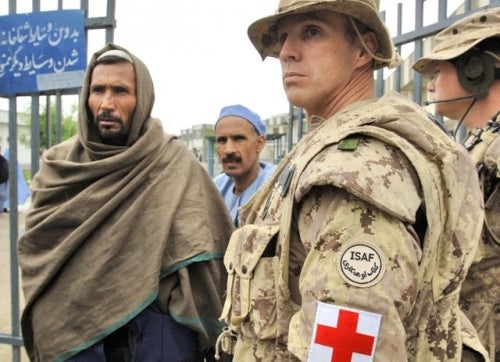He served as a peacekeeper in the Former Republic of Yugoslavia, worked with European allies on a humanitarian mission in Eastern Africa, and ran a Canadian field hospital in Afghanistan— but for kinesiology alumnus Colonel Jim Kile, his new role may be the most challenging yet.
As Canada’s Army Surgeon, Kile is responsible for overseeing the health and well-being of the Army’s 30,000 troops.
“It’s confusing because on the civilian side, when people hear the word surgeon, they think I am in fact a surgeon,” said Kile, who received a medical degree from the University of Toronto after leaving Waterloo.
But in the military, the term surgeon refers to medical doctors in leadership roles with varying types of specialization— and as the Army’s top clinical advisor, Kile has many.

As part of a Canadian military outreach program called Operation Aesculapius, Colonel Kile and his medical team visit Afghanistan hospitals to provide clinical and equipment support.
The Army’s top doctor
Trained in biological warfare medical countermeasures by the elite United States Army Medical Research Institute for Infectious Diseases and in emergency medicine by the University of Ottawa, Kile’s years of health-related education allow him to analyze data and make decisions to protect the well-being of Canadian troops at home and abroad.
“When the Army Commander or his senior staff have concerns about the safety and well-being of deployed troops, I need to answer those concerns immediately,” said Kile.
He advises the Surgeon General and the Commander of the Canadian Army on all major health-related matters concerning ground forces. When Ebola struck West Africa, he was called in to quickly interpret incoming information and keep top brass apprised of the situation. He has been asked to advise the chain of command on everything from mental-health management to the optimum standard of care possible on the battlefield.
“I see my role as taking that medical area of grey and making it more black and white,” he said.
Describing himself as a “Jack-of-all-trades and a master of some,” day-to-day, Kile’s duties range widely: from consulting on individual health issues and trouble-shooting unforeseen medical matters to mentoring more junior physicians on leadership and having oversight on training troops set to deploy.
“Teaching troops simple medical procedures, such as fine needle decompression of a collapsed lung, can save lives,” he said. “There is a lot to learn, I need to advise the system on how to find that delicate balance between over-training and making sure they’re ready.”
As part of his emergency medicine specialization, Kile sits on a NATO expert panel where he was recently responsible for updating allied field policy for tactical combat casualty care, emergency psychiatric treatment, and the urgent management of adnominal and chest wounds.
“I won’t say I’ve seen it all, but my length of service has given me a broad perspective on war and casualties,” said Kile.
Inspiring the next generation of military doctors
Acting as the advisor to all Canadian Armed Forces doctors with the rank of Major and above, Kile is also instrumental in shaping the next generation of medical leaders.
“By far being able to influence many of the younger doctors' careers is one of the most satisfying parts of my job,” he said. “In my case, I never planned on staying in the Army, but during my first deployment I finally got an appreciation of what the military does and it was incredibly impressive. My goal is for young doctors to have similar opportunities.”
With an eye towards the future of military medicine, Kile is also mindful of those who have paved his way. Last November, he paid tribute to one of the most famous military doctors, Col. John McCrae, when he, along with other members of the Royal College History and Heritage Advisory Committee and the John McCrae House, successfully lobbied for McCrae to be inducted into the Canadian Medical Hall of fame.
“Although most don’t recognize it, before he was a poet, he was a doctor,” said Kile, who presented McCrae’s great grand-nephew with a gold medal at the induction ceremony.
“I consider myself incredibly fortunate to be part of the Canadian Armed Forces and its legacy. The young soldiers who go outside the wire in war zones are some of the bravest, most professional people I’ve ever met.”